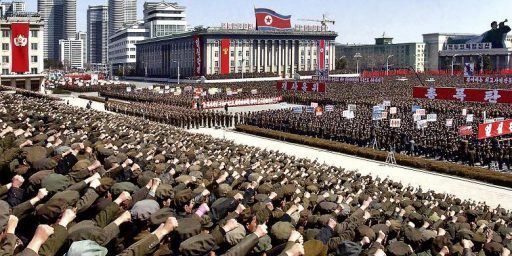North Korea Calming Down?
In a chaotic week, one source of chaos was remarkably quiet.
Noticeably absent from the news headlines in what was otherwise one of the most intense news weeks in awhile were any rumblings out of North Korea. Given the rhetoric has that been coming out of Pyongyang over the past two months or so, this was somewhat surprising especially given the fact that Mondday, the day of the bombing at the Boston Marathon was also the 101st birthday of Kim il Sung, the founder of the DPRK. As it turned out, the day passed in Pyongyang relatively quietly, which is a change from previous years. The one statement that did come out of the north was a statement that it would not talk until sanctions are lifted and the U.S. and South Korea end their military exercises, which are scheduled to end later this month in any case. Some observers are looking at this and thinking it may be a sign that the North Koreans are beginning to dial down the inflamed rhetoric of the past several months:
SEOUL — Government officials and security analysts in the region say North Korea is scaling back its campaign of threats and showing signs it wants to ease tensions with South Korea and the United States.
That assessment, gaining credence among policymakers in recent days, does not mean that North Korea will soon agree to talks or that the long-term threat posed by its weapons program has been reduced. But officials say they are encouraged by a shift over the past week in Pyongyang’s rhetoric, which, though still venomous, now includes hints about reconciliation.
“The tensions should gradually decrease from here, but we cannot lose ourselves” to complacency, a South Korean Defense Ministry official said, speaking on the condition of anonymity to convey government thinking. “We do still have to be prepared for any provocations.”
Dialogue will be difficult, because Washington and Pyongyang are fundamentally at odds over what must happen first. On Thursday, the North issued a statement laying out its conditions for talks, including the lifting of U.N. sanctions and the removal of all U.S. nuclear assets from the region. The United States, which has already rejected such steps, instead wants Pyongyang to live up to preexisting disarmament agreements.
Secretary of State John F. Kerry said that North Korea’s preconditions are “not acceptable,” but he appeared to welcome the glimmer of interest in talks from Pyongyang.
“I’m prepared to look at that as, you know, at least a beginning gambit,” he told the Senate Foreign Relations Committee.
Analysts say it’s noteworthy that Pyongyang is even raising the possibility of talks, given that in recent weeks it has pledged nuclear annihilation of the United States, South Korea, Japan and Guam. That rhetoric, coupled with the North’s renewed effort toproduce weapons-grade plutonium and its temporary suspension of a joint industrial complex near the North-South border, helped push tensions on the Korean Peninsula to their highest point in two decades.
In other demands, North Korea urged the South to stop blaming it for a recent cyberattack and for the 2010 torpedoing of a South Korean ship. It also called for an end to what it called “nuclear war drills,” including U.S.-South Korean military exercises set to conclude later this month.
As always, it’s hard to know exactly what is going through the minds of the leadership in Pyongyang, or to figure out what they want or what they will do next. It’s entirely possible that next week we’ll be back to the rhetoric of two weeks ago and tensions will continue to escalate on the Korean Peninsula. At the same time, though, the North Koreans do have to realize that they really only have two options. Either they keep ramping up the rhetoric to the point where military confrontation becomes inevitable, in which case they will be destroyed, or they ratchet it down and find a face-saving way back to the negotiation table. Added in to that is the fact that their Chinese benefactors may well be putting pressure on them to tone it down before the situation on the peninsula becomes uncontrollable, which would definitely not be in China’s interests.
Where we go from here will be easy to tell, just watch what North Korea says or does next.
H/T: Reason







It would appear that Mr. Kerry and Mr. Obama handled this very well.
I think they just don’t want to share the spotlight.
They are a bunch of drama queens who make unserious threats — they would really have to ramp things up to a dangerous level to make news this week. They will be back in a couple of weeks, promising to turn some misidentified American city into a sea of fire, and revealing their badly photoshopped troops on amphibious unicorns or something.
(Also, the owners and management of the exploding fertilizer plant in West, Texas must be breathing a sigh of relief. In a just world, they would be strung from lamp posts, even if FEMA had to be dispatched to put up some lamp posts for that purpose)
It’s like children and dogs – ignore the tantrums/barking and they will stop.
@Gustopher:
To be fair, we still don’t know the cause of that incident. Any fire in a plant with that kind of a volatile compound has the potential to turn into disaster.
@Doug Mataconis: Yes, but it’s better if your firefighters are trained to fight chemical fires in cases like this. You don’t treat a fire involving anhydrous ammonia or ammonium nitrate like it’s a wood fire.
This will turn out to be a case of acute stupidity all around, I bet.
@Doug Mataconis: Ah, but that’s the problem… There was no reason for: 1) An out of control fire to arise at a properly managed plant and 2) Storage processes that are allowed to be susceptible to fire or endanger the public.
I’ve worked in chemical plants where they safely managed highly reactive chemistries. Those sites were designed top-to-bottom with safeguards in mind including mitigating features to ensure that blow-outs are properly directed away from people. Also, workers had safe practices and training drilled frequently and deeply. Trust me, for a plant explosion the buck *always* stops at the management. *They* set the safety environment. *They* are responsible for minimizing harm. The workplace culture has to be established such that no ‘act of god’ is an excuse and that we don’t accept that accidents ‘just happen’. Accidents are what happen when management fracks up with engineering and training.
Not trying to be harsh on you, Doug, but most people who don’t work in these plants don’t really understand the critical importance of ‘safety first’ that infuses work at properly managed site.
I, for one, feel much better. The most disturbing part about this latest flare up was that they were making threats, but no demands. That’s a recipe for psychotic violence in either a person or a country.
@Argon: According to reports, last year the plant was storing 1,350 times the amount of ammonium nitrate that would trigger oversight and regulation, but did not inform DHS as required.
This explosion was likely caused by a culture of evading regulation, oversight, and safety rules — barring a surprise terrorist strike in the heart of West, Texas. Cut corners, and know that you will never be held accountable, because it was all a tragic accident.
These types of “accidents” will continue until we change that culture. Either through vigorous enforcement of regulation, or vigorous prosecution of the managers when these accidents do happen. Negligent homicide may well be the right charge, although that means they would be getting off pretty easy for the damage they cause.
Given that they are gambling with their employees lives, they should really pay with their own when they lose. Rest of their life in jail, or strung up from a lamp post, whatever. However, any criminal prosecutions would be a step in the right direction, and might begin to change that culture.
@Gustopher: Yeah but them there regulations are baaaad!!1